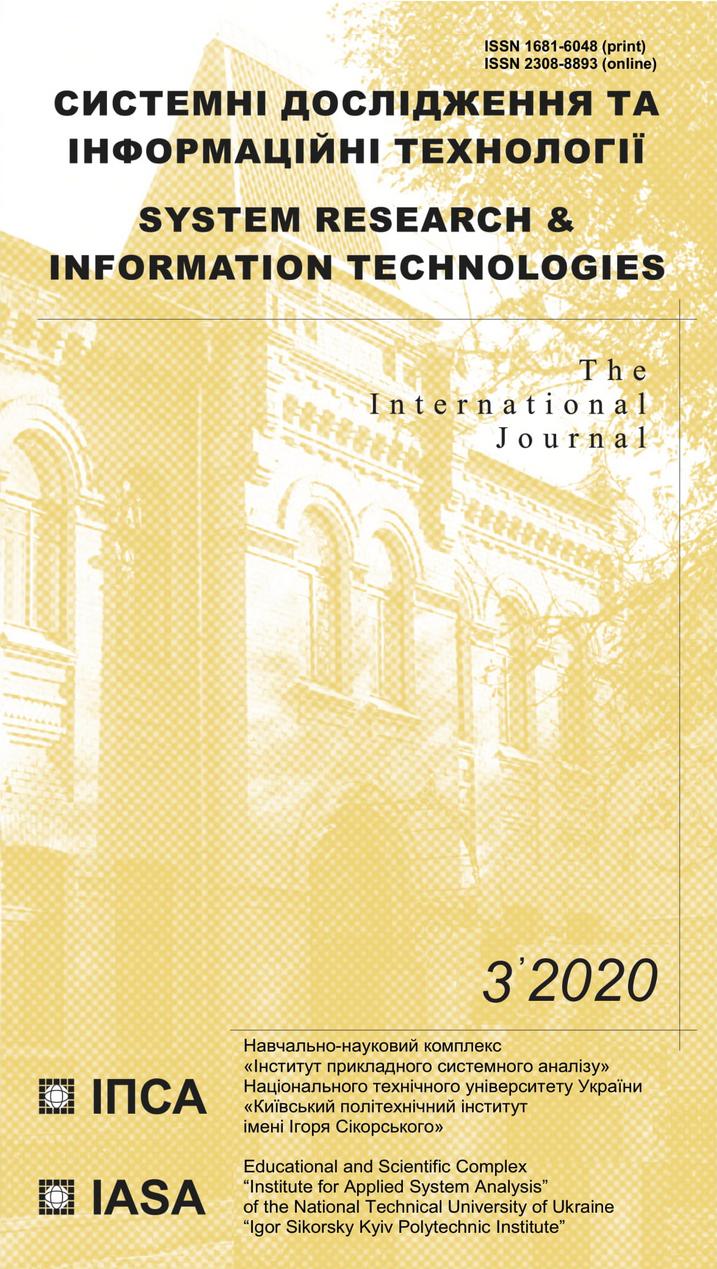Multicriteria conditional optimization based on genetic algorithms
DOI:
https://doi.org/10.20535/SRIT.2308-8893.2020.3.07Keywords:
multicriteria optimization, conditional optimization, genetic algorithms, repairing algorithm, SPEA2, Pareto optimizationAbstract
This article takes on solving the problem of multicriteria conditional optimization. This problem is one of the most key tasks of the current time and has its application in many areas. Reuse of various existing algorithms for solving unconstrained optimization is proposed. Different methods of multicriteria unconditional optimization are reviewed. The advantages and disadvantages of each algorithm are analyzed. The algorithms modified to take into account the constraints. Additional algorithms of transition from solving an unconditional optimization problem to a conditional optimization problem are developed. A genetic algorithm SPEA2 was used to test the developed algorithms. Examples of solving the problem at hand using the aforementioned algorithms are presented. A comparative analysis of the final results was conducted.References
A.P. Braga, R.H. Takahashi, M.A. Costa, and R. Teixeira, “Multi-Objective Algorithms for Neural Networks Learning”, Multi-Objective Machine Learning. Studies in Computational Intelligence, vol. 16. Berlin, Heidelberg: Springer, 2016. Available: https://doi.org/10.1007/3-540-33019-4_7
Carlos Artemio Coello Coello, “An Empirical Study of Evolutionary Techniques for Multiobjective Optimization in Engineering Design”, PhD thesis. Department of Computer Science, Tulane University, New Orleans, LA, April 1996.
C.A. Coello Coello, A comprehensive survey of evolutionary-based multiobjective optimization techniques. Laboratorio Nacional de Informatica Avanzada, Veracruz, Mexico, 1998. Available: https://doi.org/10.1007/BF03325101
E. Zitzler, M. Laumanns, and L. Thiele, “Spea2: Improving the strength pareto evolutionary algorithm for multiobjective optimization”, Evolutionary Methods for Design Optimization and Control with Applications to Industrial Problems. International Center for Numerical Methods in Engineering, Athens, Greece, 2001, pp. 95–100.
S.V. Groshev, A.P. Karpenko, and V.A. Martynyuk, “The effectiveness of population-based Pareto-approximation algorithms. Experimental comparison”, on-line journal “Naukovedenie”, 8(4), 2016. doi: 10.15862/67EVN416.
A.V. Gumennikova, “Hybrid adaptive search algorithm for solving problems of conditional multi-criteria optimization”, Siberian Journal of Science and Technology, iss. 5, pp. 70–76, 2004.
A.V. Gumennikova, “On the evolutionary approach to solving multicriteria problems of conditional optimization”, in VIII international scientific-practical conference “System analysis in the project and management”, St. Petersburg, 2004, pp. 72–76.
A.V. Gumennikova, “Solving multicriteria problems of conditional and unconditional optimization using genetic algorithms MultiobjectiveGA v.1.0”, Computer curriculum and innovation, no. 8, p. 16, 2005.
K. Deb and B.R.N. Uday, “Investigating Predator–Prey algorithms for multi-objective optimization”, KanGAL, Kanpur, Indian, Rep. 2005010, Dec. 2005.
K. Deb, S. Agrawal, A. Pratap, and T. Meyarivan, “A fast and elitist multiobjective genetic algorithm: NSGA-II”, IEEE Trans. Evol. Comput., vol. 6, no. 2, pp. 182–197, Apr. 2002. doi: 10.1109/4235.996017
Karl O. Jones, “Comparison of genetic algorithm and particle swarm optimization”, in International Conference on Computer Systems and Technologies, 2005.
A.P. Karpenko, Modern search engine optimization algorithms. Algorithms inspired by nature, Moscow: Publishing House MSTU, 2014.
A.F. Kuri-Morales and J. Gutiérrez-García, “Penalty Function Methods for Constrained Optimization with Genetic Algorithms: A Statistical Analysis”, Lecture Notes in Computer Science, vol. 2313. Berlin, Heidelberg: Springer, 2002. Available: https://doi.org/10.1007/3-540-46016-0_12
M. Laumanns, G. Rudolph, and H.P. Schwefel, “A spatial predator-prey approach to multi-objective optimization: A preliminary study”, in Proceedings of the Parallel Problem Solving from Nature, V, pp. 241–249, 1998. Available: https://doi.org/ 10.1007/BFb0056867
David Orvosh and Lawrence Davis, “Using a Genetic Algorithm to Optimize Problems with Feasibility Constraints”, IEEE Conference on Evolutionary Computation – Proceedings, vol. 2, pp. 548–553, 1994. Available: https://doi.org/10.1109/ICEC.1994.350001
J. Schaffer, “Multiple Objective Optimization with Vector Evaluated Genetic Algorithms”, Proceedings of the First Int. Conference on Genetic Algortihms, pp. 93–100, 1985.
E.S. Semenkin, O.E. Semenkina, and S.P. Korobeinikov, Optimization of technical systems. Tutorial. Krasnoyarsk: SIBMP, 1996.
O.E. Semenkina and V.V. Zhidkov, Optimization of management of complex systems by the method of generalized local search. MAKS Press, 2002.
Tomio Umeda and Atsunobu Ichikawa, “A Modified Complex Method for Optimization”, Industrial & Engineering Chemistry Process Design and Development, 10 (2), pp. 229–236, 1971. doi: 10.1021/i260038a016
Yu.I. Zhuravlev and Yu.Yu. Finkelstein, “Local Algorithms for Linear Integer Programming Problems”, Cybernetics problems, iss. 14, pp. 289–295, 1965.

